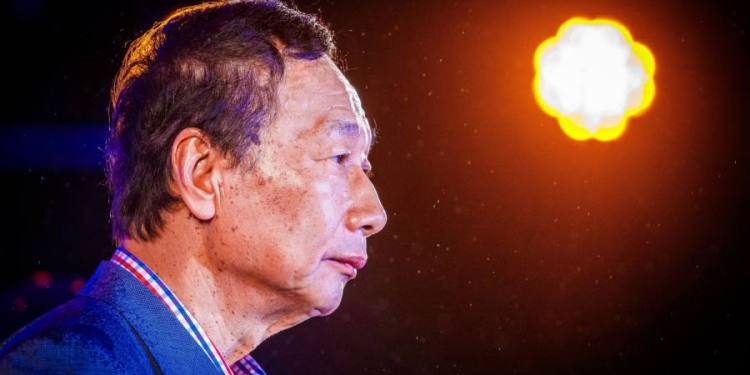Receive free Taiwan updates
We’ll send you a myFT Daily Digest email rounding up the latest Taiwan news every morning.
Terry Gou, the billionaire founder of Apple supplier Foxconn, has left the company’s board following his decision to run to be Taiwan’s next president.
The move to step down, which Foxconn announced on Saturday night, appeared aimed at shielding the world’s largest contract electronics manufacturer from any political fallout from his campaign for the election on January 13.
Gou could also cite it to respond to concerns that Foxconn’s massive investments in China could subject him to pressure from the Chinese Communist party, which wants to unify Taiwan under Beijing’s control.
He remains a major Foxconn shareholder with a 12.5 per cent stake in the company and has not said whether he intended to put his shares into a trust or sell them to avoid possible conflicts of interest.
The Foxconn founder has joined a crowded presidential race, which he looks unlikely to win. According to the latest survey by Taiwan pollster Formosa, conducted this week, his support stands at 11.6 per cent. He trails behind two other opposition candidates as well as Lai Ching-te, the vice-president and candidate of the ruling Democratic Progressive party, who leads the race with 35 per cent support.
As China is waging a campaign of military pressure against Taiwan, Gou and other opposition candidates cast the election as a choice between peace and war and blame the DPP government for rising tension with Beijing.
Gou backs closer economic ties with China and has promised to bring 50 more years of peace to the country, a claim that critics said raised concerns over what concessions he might make to Beijing.
Foxconn operates the world’s largest iPhone plant in China, one of dozens of large-scale factory complexes in the country where it assembles and makes components for gadgets from television sets to personal computers.
Although it is expanding in other locations including Vietnam, India and Mexico in response to pressure from customers who want to diversify their supply chains, some 75 per cent of the company’s operations remain in China, according to Liu.
The 72-year-old tycoon handed the reins of Foxconn to new chair Young Liu four years ago when he first entered politics, seeking the nomination of the opposition Kuomintang for the last presidential election.
Pressed on whether he would sell or freeze his shares if elected when he announced his presidential candidacy on August 28, Gou said he had never done business with the Taiwan government. “Not a single deal! So I can withstand scrutiny,” he said.
The company said Gou resigned as a director due to “personal reasons”. It said there was no need to immediately replace him.


![https://primexbt.investments/start_trading/?cxd=459_549985&pid=459&promo=[afp7]&type=IB](https://tradinghow.com/wp-content/uploads/2025/02/primexbt-markets-e1738588646201.jpg)
![https://primexbt.investments/start_trading/?cxd=459_549985&pid=459&promo=[afp7]&type=IB](https://tradinghow.com/wp-content/uploads/2025/02/primexbt-markets.jpg)
![https://primexbt.investments/start_trading/?cxd=459_549985&pid=459&promo=[afp7]&type=IB](https://tradinghow.com/wp-content/uploads/2025/02/PrimeXBT-Trading.jpg)












